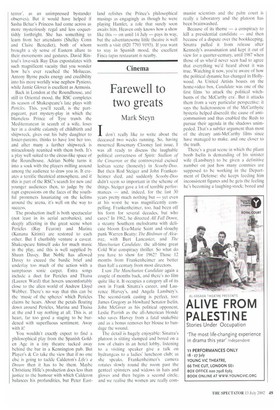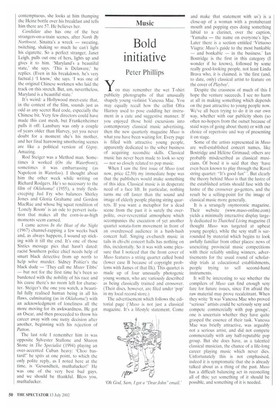Cinema
Farewell to two greats
Mark Steyn
Idon't really like to write about the deceased two weeks running. So, having mourned Rosemary Clooney last issue, I was all ready to discuss the laughable political correctness of Spirit: Stallion of the Cimarron or the controversial excised lesbian scene (honestly) in Scooby-Doo. But then Rod Steiger and John Frankenheimer died, and suddenly Scooby-Doo didn't seem so important in the scheme of things. Steiger gave a lot of terrible performances — and, indeed, for the last 30 years pretty much nothing but — yet even at his worst he was magnificently compelling. Frankenheimer, too, had been off his form for several decades, but who cares? In 1962, he directed All Fall Down, a steamy Southern melodrama with delicate bloom Eva-Marie Saint and slouchy punk Warren Beatty; The Birdman of Alcatraz, with Burt Lancaster; and The Manchurian Candidate, the all-time great Cold War conspiracy thriller. So what do you have to show for 1962? Those 12 months from Frankenheimer are better than half a century from most directors.
I saw The Manchurian Candidate again a couple of months back, and there's no film quite like it. It occupies a category all of its own in Frank Sinatra's career, and Laurence Harvey's, and Angela Lansbury's. The second-rank casting is perfect, too: James Gregory as blowhard Senator Iselin, John McGiver as his political opponent, Leslie Parrish as the all-American blonde who saves Harvey from a fatal snakebite and as a bonus removes her blouse to bandage the wound.
The detail is hugely enjoyable: Sinatra's platoon is sitting slumped and bored on a row of chairs in an hotel lobby, listening to a visiting speaker give a talk on hydrangeas to a ladies' luncheon club; as she speaks, Frankenheimer's camera rotates slowly round the room past the genteel spinsters and widows in hats and gloves and then begins a second circle, and we realise the women are really corn
munist scientists and the palm court is really a laboratory and the platoon has been brainwashed.
Because of its theme — a conspiracy to kill a presidential candidate — and then because of a dispute over the bookkeeping, Sinatra pulled it from release after Kennedy's assassination and kept it out of view for a quarter-century, until 1987 when those of us who'd never seen had to agree that everything we'd heard about it was true. Watching it now, you're aware of how the political dynamic has changed in Hollywood. As United Artists boasts on the home-video box, Candidate was one of the first films 'to attack the political witchhunts of the McCarthy era'. But it attacks them from a very particular perspective: it says the ludicrousness of the McCarthyite hysteria helped discredit the cause of anticommunism and thus enabled the Reds to pursue their agenda in the shadows unimpeded. That's a subtler argument than most of the dreary anti-McCarthy films since have managed to make, and one closer to the truth.
There's a great scene in which the pliant boob Iselin is demanding of his sinister wife (Lansbury) to be given a definitive number on just how many commies are supposed to be working in the Department of Defense: she keeps feeding him inconsistent figures and he gets the feeling he's becoming a laughing-stock; bored and contemptuous, she looks at him thumping the Heinz bottle over his breakfast and tells him there are 57. He believes her.
Candidate also has one of the best strangers-on-a-train scenes, after North By. Northwest. Sinatra's a wreck — sweating, twitching, shaking so much he can't light his cigarette. So a perfect stranger, Janet Leigh, pulls out one of hers, lights up and gives it to him. 'Maryland's a beautiful state,' she says. 'This is Delaware,' he replies. (Even in his breakdown, he's very factual.) 'I know,' she says. 'I was one of the original Chinese workmen who laid the track on this stretch. But, urn, nevertheless, Maryland is a beautiful state.'
Ifs weird: a Hollywood meet-cute that, in the context of the film, sounds just as odd as any secret Red code, especially the Chinese bit. Very few directors could have made this cast mesh, but Frankenheimer pulls it off: Lansbury was only a couple of years older than Harvey, yet you never doubt for a moment she's his mother, and her final harrowing smothering scenes are like a political version of Gypsy. Amazing.
Rod Steiger was a Method man. Sometimes it worked (On the Waterfront); sometimes it was embarrassing (as Napoleon in Waterloo). I thought about him the other week while writing on Richard Rodgers. He's so necessary to the film of Oklahoma! (1955), a truly fleshcreeping Jud Fry who balances Shirley Jones and Gloria Grahame and Gordon MacRae and whose big squat rendition of 'Lonely Room' is an ode to pervert isolation that makes all the corn-is-as-high moments seem earned.
I came across In the Heat of the Night (1967) channel-zapping a few weeks back and, as always happens, I wound up sticking with it till the end. It's one of those Sixties message pies that hasn't dated: racist Southern police chief needs help of smart black detective from up north to help solve murder. Sidney Poitier's the black dude — 'They call me Mister Tibbs' — but not for the first time he's been so burdened with the nobility of his race and his cause there's no room left for character. Steiger's the one you watch, a beautiful fully realised human being in all his flaws, culminating (as in Oklahoma!) with an acknowledgment of loneliness all the more moving for its awkwardness. He got an Oscar, and then proceeded to throw his career away with one nutty decision after another, beginning with his rejection of Patton.
The last role I remember him in was opposite Sylvester Stallone and Sharon Stone in The Specialist (1994) playing an over-accented Cuban heavy: 'Cho° bastard!' he spits at one point, to which the only polite reply, as I noted here at the time, is 'Gesundheit, muthafucker!' He was one of the very best bad guys, and we should be thankful. Bless you, muthafucker.



































































 Previous page
Previous page